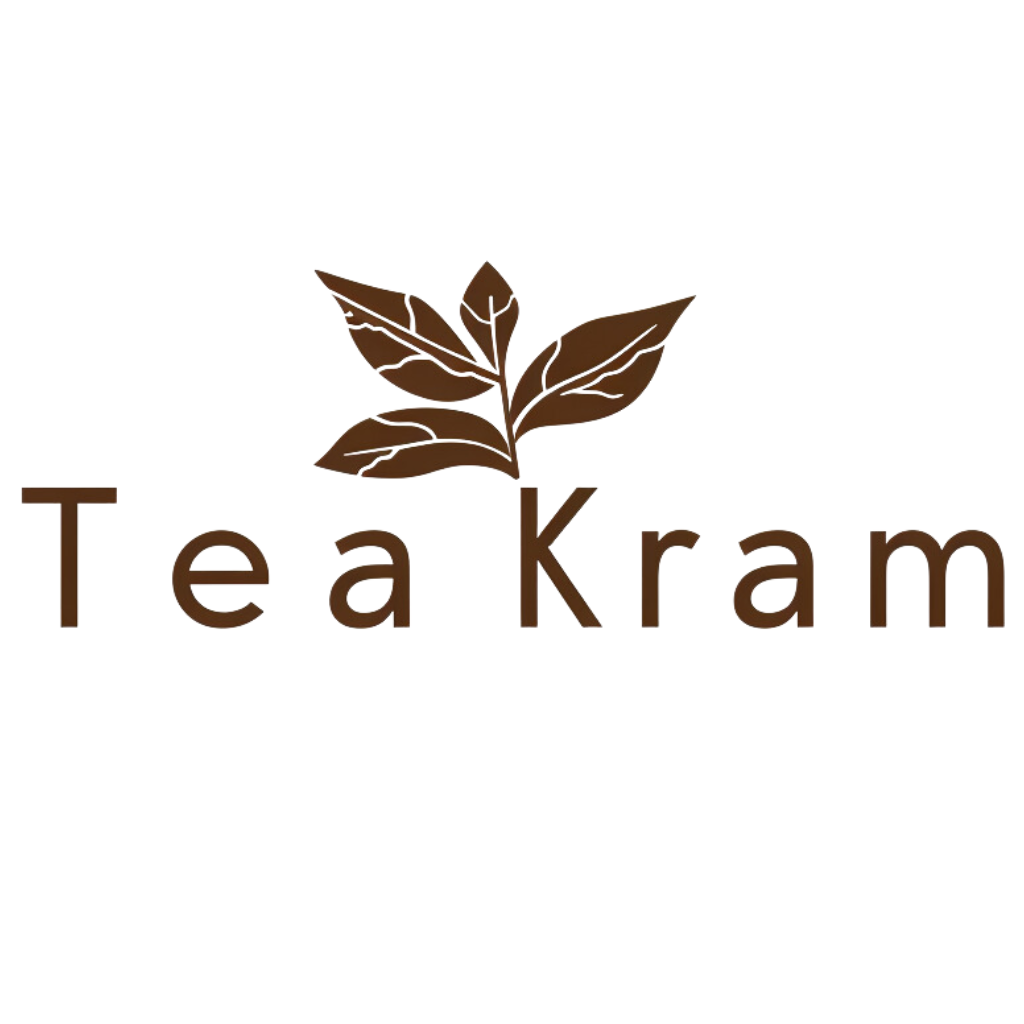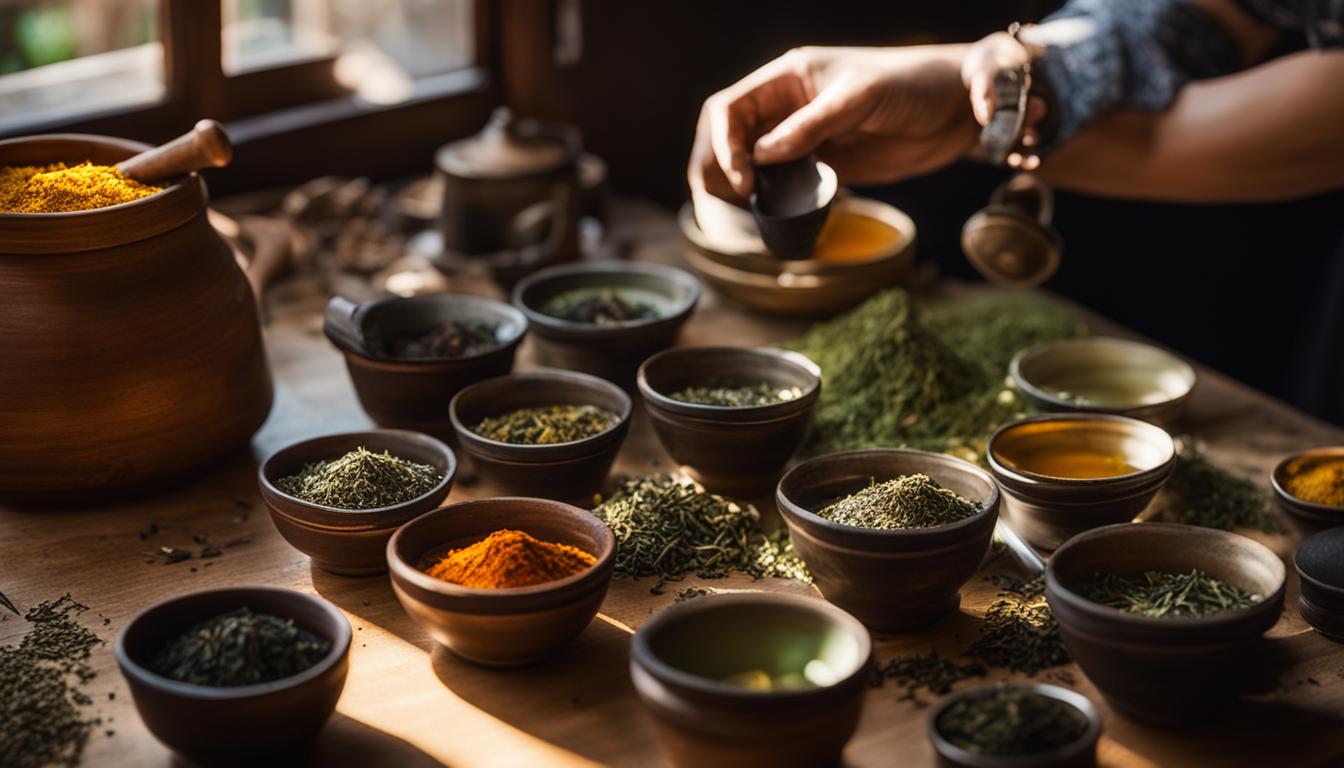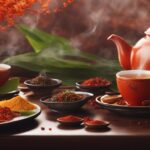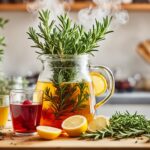Embarking on the path of crafting tea blends is an invitation to a world where tradition meets personal expression, leading to the creation of perfect infusions. When you plunge into the art of tea blending, you are taking up an age-old practice that has burgeoned into a modern-day pursuit of flavor, scent, and visual delight. To create your own tea is to pour a part of yourself into each cup, an opportunity to imbue every sip with an intimate essence that cannot be replicated.
As you blend, consider the symphony of flavors at your fingertips, poised to come together in unique concertos of taste and aroma. Tea blending techniques, passed down through generations, are now yours to reinvent, offering a canvas for your creativity. Whether an enthusiast seeking to perfect your morning ritual or a connoisseur chasing the ultimate blend, the craft lies in your hands.
Key Takeaways
- Explore the timeless practice of crafting tea blends and how it can personalize your tea drinking experience.
- Grasp the essential tea blending techniques that are key to achieving perfect infusions.
- Discover the joy in the ability to create your own tea blends, tailored to unfold unique flavors and aromas.
- Immerse yourself in the interplay of different ingredients that elevate a mere cup to a crafted beverage.
- Embrace the journey of combining tradition with innovation in the pursuit of your signature blend.
The Art of Tea Blending: An Introduction to Crafting Your Own Infusions
Embarking on the journey of the tea blending process is an exploration of both culture and personal taste. It is a creative craft that has been honed over centuries, allowing anyone to morph into an artisan of their very own tea creation. Each blend tells a story, from the carefully handpicked leaves to the final, steaming cup that warms the soul. This section immerses you in the foundational aspects of tea blending, guiding you through the delicate balance of flavors that make up artisan tea blends, and the rich satisfaction derived from concocting your unique tea blends and custom tea blends.
Understanding the Basics of Tea Blending
Tea blending is a symphony of flavors, combining different tea varieties, each with its own character. The categorization of teas—white, green, oolong, and black—reflects their oxidation levels, which significantly influence the taste and aroma of the blend. The leaves and buds are selected with precision, often complemented with flowers, spices, and fruits to create intricate and unique tea blends. This blend of natural ingredients, when done skillfully, can result in a harmonious infusion that captivates all your senses.
Why Create Your Own Tea Blends?
Creating custom tea blends is a deeply personal and rewarding experience. It allows for the satisfaction of tailored health benefits, as well as fitting into one’s personal health preferences. The essence of tailored blends lies in the enhancement of the sensory experience—an aromatic journey and a palette of flavors that elevate each sip to a level unmatched by off-the-shelf varieties. Additionally, blending your own tea serves as a bridge to cultural traditions, connecting you to the timeless art that has been a part of human history for generations.
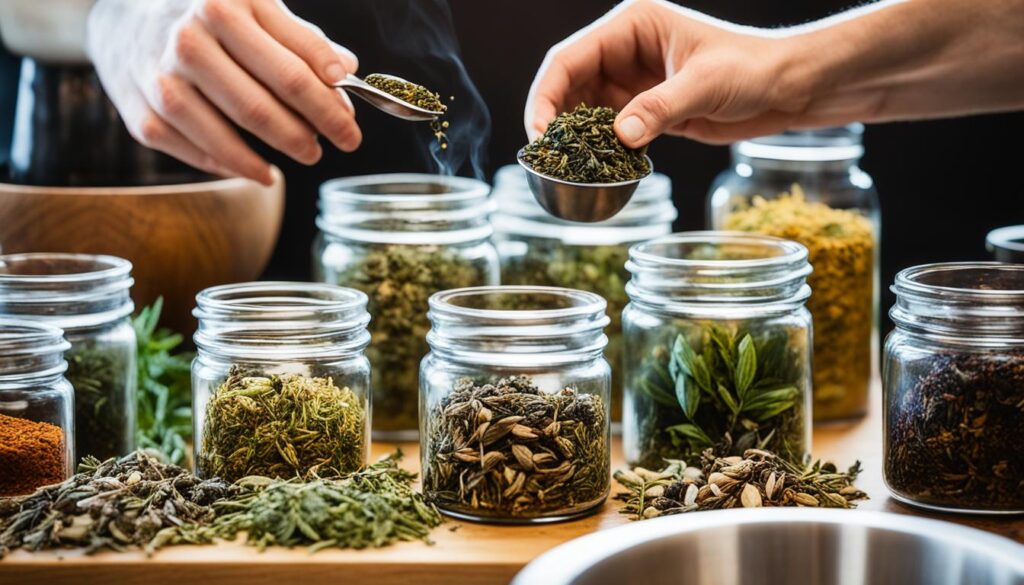
| Type of Tea | Flavor Profile | Oxidation Level | Common Blending Ingredients |
|---|---|---|---|
| White Tea | Delicate, lightly sweet | Minimal | Chamomile, lemongrass, jasmine |
| Green Tea | Grassy, astringent | Low | Mint, ginger, citrus peels |
| Oolong Tea | Complex, floral | Varies (light to heavily oxidized) | Ginseng, osmanthus flowers, orange blossom |
| Black Tea | Bold, robust | High | Cinnamon, cardamom, bergamot |
Unveiling the Secrets of Tea Blending Techniques
The art of crafting tea blends is steeped in tradition, yet it thrives on innovation. Mastering this craft involves not just a knowledge of leaves and flavors but the delicate interplay of scent, visual appeal, and taste balance. As you embark on your own journey to create artisan tea blends, understanding these techniques is pivotal.
Leveraging aroma in tea blends opens up a new dimension of sensation. The process of scenting, for instance, involves infusing the leaves with flowers, spices, or herbs, which impart their delicate fragrance to the tea. Jasmine pearls are a classic example, where the scenting of tea leaves with jasmine blossoms results in a harmonious blend that is a treat for both the palate and the nose.
Visual aesthetic plays an underestimated role in the enjoyment of tea. A visually appealing blend can enhance the overall sensory experience, making the act of drinking tea more pleasurable. The addition of vibrant rose petals or the rich blue hue of butterfly pea flowers can transform a simple cup into a visual indulgence.
When you begin crafting tea blends, consider how each ingredient will contribute to the overall taste profile. A successful blend balances the strength of its base tea with complementary flavors, ensuring that no single component overwhelms the others. Thoughtful layering of flavors can lead to complex and pleasing taste experiences.
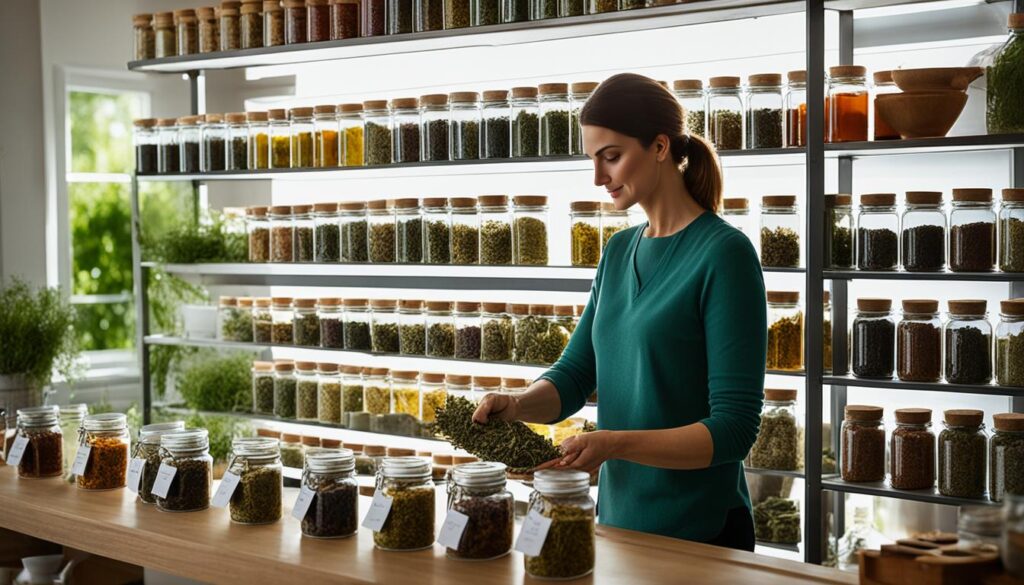
Tea blending is an alchemy where precision meets imagination. The measurement of leaves, the timing of infusion, and the choice of enhancements all matter. But it’s the creative vision of the blender that makes each cup an artwork.
To help elucidate these techniques further, let’s explore the essential tools that every tea blender should have in their repertoire:
| Tool | Function | Significance in Tea Blending |
|---|---|---|
| Scales | For precise measurements | Critical for ensuring the correct ratios for consistent tea blending recipes. |
| Sieve or Sifter | To separate tea leaves by size | Allows for a uniform brewing experience and a clear aesthetic. |
| Infusion Globes | For scenting and flavoring | Enables an intimate fusion of tea leaves with chosen scents and additional ingredients. |
| Mixing Bowls | To blend ingredients | A wide, clean space is essential for combining components evenly. |
| Storage Tins | For keeping tea fresh | Seals in the flavor and aroma crucial for maintaining the integrity of artisan tea blends. |
With tools in hand and techniques at your fingertips, the act of blending transcends from simple steps to a dance of flavors. Like any craft, mastering tea blending recipes and techniques takes patience and practice. Yet each brew is an opportunity to share a unique story—a blend that is distinctively yours.
From Garden to Cup: Selecting the Right Ingredients for Homemade Tea Blends
The delicate art of creating homemade tea blends starts with choosing high-caliber ingredients. Every cup of tea is a journey – one that begins long before hot water meets tea leaves. It’s a tale of craftsmanship, where the quality of leaves, aromatic herbs, and spices used determines the richness of the narrative.
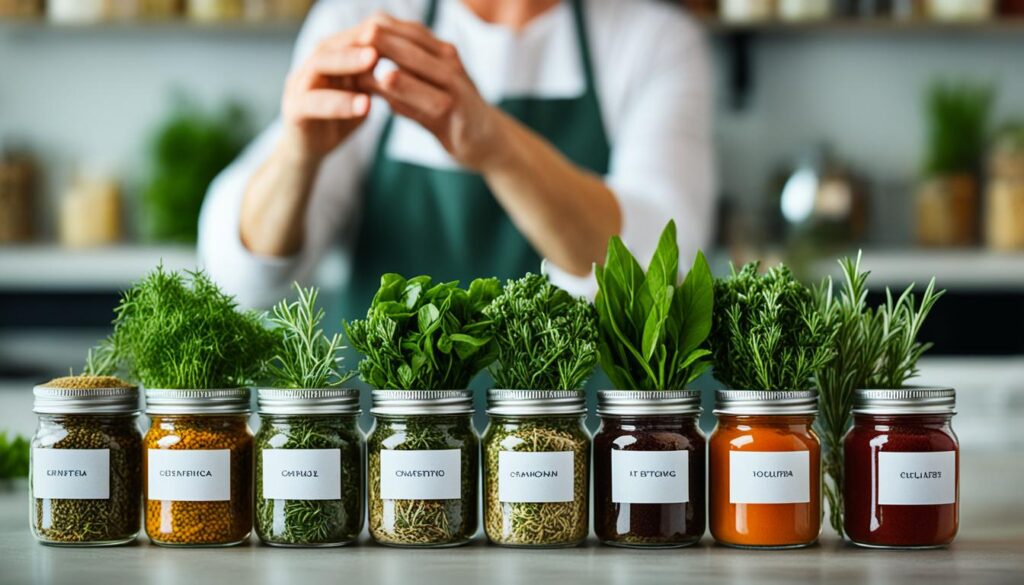
Choosing Quality Leaves for Your Base
Selecting the perfect base for your tea blending process is much like choosing the foundation for your home; it dictates the integrity and flavor profile of your blend. The quest for quality leaves can take you across different origins, from the misty hills of Darjeeling to the high elevations of Fujian. Factors such as harvesting methods, maturity of the leaves, and the timing of the harvest all contribute to the subtleties in flavor that a discerning palate can appreciate. Here’s how to vet for the finest:
- Verify the source of your tea leaves to ensure they’ve been grown in optimal conditions without harmful pesticides.
- Opt for whole leaves over broken ones to preserve essential oils and deliver a fuller, more nuanced taste.
- Consider the level of oxidation in your leaves: green tea is minimally oxidized, black tea fully, with oolong and white tea falling in between.
Incorporating Aromatic Herbs and Spices
Infuse your tea with character by introducing aromatic herbs and spices to your blend. These additions are not mere embellishments; they’re transformative agents that can elevate a simple brew into an exotic escape. Whether you’re seeking the calming embrace of lavender or the fiery kick of ginger, these botanical boosters can significantly expand the spectrum of flavors in your homemade teas. Here’s a starter guideline for pairing your tea bases with herbs and spices:
| Tea Base | Herb/Spice | Flavor Profile |
|---|---|---|
| Black Tea | Cardamom | Warm, sweet with a gentle hint of spice |
| Green Tea | Mint | Refreshing, cool with a subtle peppery finish |
| Herbal Tea | Cinnamon | Spicy, sweet with a comforting warmth |
| White Tea | Chamomile | Delicate, floral with a soothing effect |
Balance and Proportion: The Key to Harmonious Blends
To bring your homemade tea blends to life, mastering the balance and proportion of ingredients is key. The harmony of flavors within your blend determines its success. Achieving this balance is a skillful dance between quality leaves, the nuanced flavors of aromatic herbs, and the piquant depths of spices. Aim for a blend that doesn’t allow any single note to overshadow the others, unless, of course, a pronounced flavor is your intentional masterpiece. Consistency in measure and an adventurous yet judicious palate are your companions on this blending journey.
- Start with a 3:1 ratio of tea to herbs and spices, and adjust according to taste.
- Create a ‘test tea’ to evaluate the potency of your herbs—stronger botanicals might need a lighter hand.
- Record your measurements and notes for each blend to replicate and refine your recipe.
Finding the perfect equilibrium in your homemade tea blends unlocks a personal eden in every sip—whether you’re sharing this joy with friends or savoring the quiet solitude of a morning cup, the bespoke experience you create is undeniably rewarding.
The Alchemy of Flavor: Crafting Tea Blends for Unique Experiences
The quest to craft the perfect cup of tea is much like alchemy—transforming the ordinary into the extraordinary. As you embark on creating unique tea blends, consider it an experiential journey that not only satiates the palate but also invigorates the senses. With tea blending techniques that have been honed over centuries, one can infuse soul and artistry into each blend, promising a unique tea experience every time.
Diving into the art of crafting tea blends, it’s essential to understand that it’s not solely about the taste. Visual appeal, aroma, and texture play crucial roles in the multisensory delight of tea. Below are some methodologies to create your signature infusion:
- Layering Flavors: Begin with a base note, add complementary flavors, and finish with a highlight that leaves a memorable aftertaste.
- Aesthetic Appeal: Use vibrant petals and spices to add a pop of color that pleases the eye.
- Texture Variations: Combine ingredients of different textures to add depth to each sip.
To accentuate the enchantment of blending, consider the moments these blends will be part of. An energizing blend of citrus and mint may awaken the spirit in the early hours, while a calming concoction of chamomile and lavender could be the perfect companion to a book before bed.
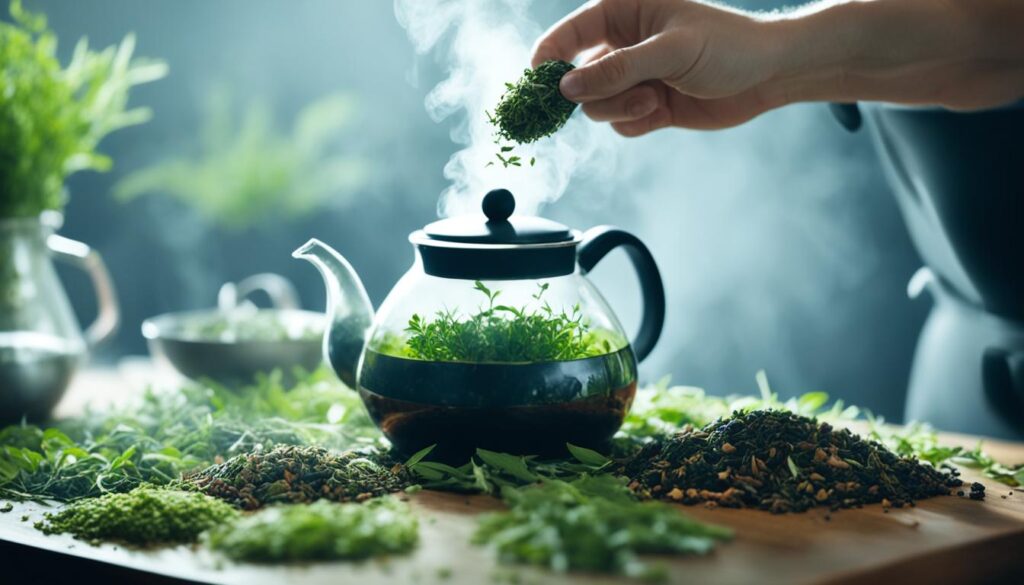
The table below provides a simple guide to pairing base teas with complementary flavors and occasions:
| Base Tea | Complementary Flavors | Suitable Occasion |
|---|---|---|
| Black Tea | Bergamot, Jasmine, Spices | Morning Wake-Up |
| Green Tea | Mint, Lemongrass, Ginger | Refresh & Renew |
| Oolong Tea | Peach, Orchid, Almond | Social Gatherings |
| White Tea | Rose, Cherry, Melon | Quiet Contemplation |
| Herbal Teas | Cinnamon, Apple, Licorice | Relax Before Sleep |
Remember, the process of crafting tea blends is inherently personal and innovative. Experimentation is the cornerstone of discovery. Each unique tea blend you create is a testament to your individual palate and creativity. With every brew, take pride in knowing you’ve crafted an experience that transcends the mere act of sipping tea—a holistic encounter that engages every sense.
Custom Tea Blends: Tailoring Flavors to Personal Taste
Embarking on the journey of creating custom tea blends offers an intimate connection to the art of tea making, allowing enthusiasts to personalize their brews to their unique flavor profile. This adventure in taste is not just about crafting a beverage, but also about discovering the nuances of one’s palate and relishing in the joy of a signature blend.
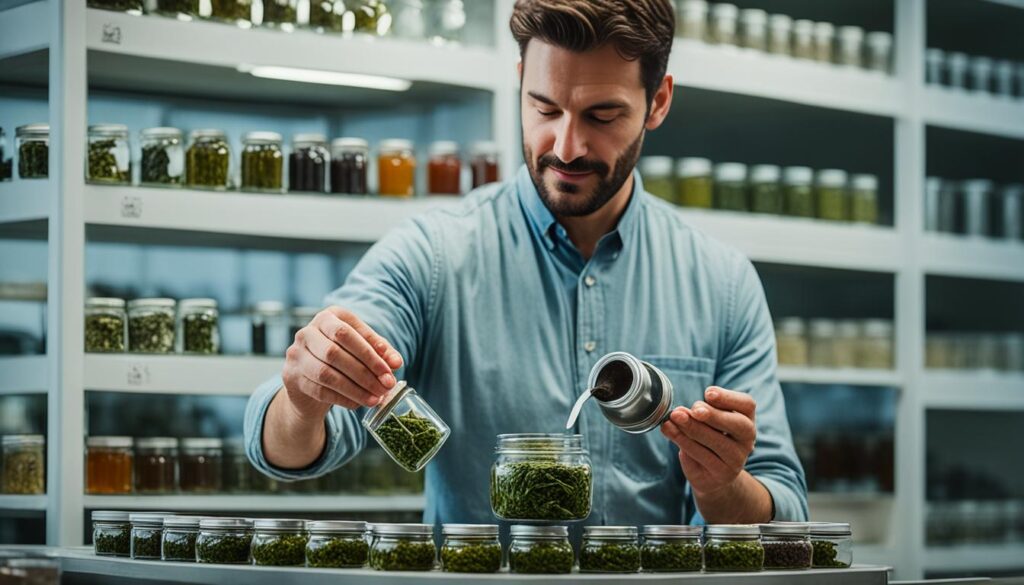
Mapping Your Flavor Profile Preferences
Identifying personal taste preferences is the cornerstone of blending teas that resonate with your senses. To map out your flavor profile, start by tasting a range of single-origin teas and note the characteristics that appeal to you. Is it the brisk astringency of a Ceylon black tea, the buttery smoothness of a Chinese green, or perhaps the spicy warmth of a masala chai blend?
Consider the components that contribute to a tea’s appeal, such as sweetness, bitterness, and aroma. Are floral notes like jasmine or rose enchanting, or do you gravitate towards earthy tones like turmeric or ginger? Recognizing these preferences will guide your choices when combining base teas, herbs, and spices to create a harmonious custom blend.
Experimentation and Testing: Finding Your Signature Blend
The alchemy of creating your signature blend lies in experimentation and testing. Start small by mixing trial batches, refining the ratios of each component after each taste test. Keeping detailed records of your recipes and tasting notes will be essential in this process. Record not just the ingredients and measurements but also the steeping times, temperatures, and your sensory impressions.
- Initial impressions: Is it love at first sip, or does it need a tweak?
- Balance and harmony: Do any flavors overpower others, or do they all contribute to a collective profile?
- Finish and aftertaste: Does the flavor linger pleasantly, or does it dissipate too quickly?
- Personal satisfaction: Does the blend align with the mood or moment you intended it for?
Through the refinement process, you’ll learn what works well together and what doesn’t, often discovering delightful surprises along the way. Embrace the trial-and-error aspect of this journey as you tweak and balance your way to a spectacular signature tea blend that is an embodiment of your personal taste.
In the realm of custom tea blends, each cup is more than just a beverage—it’s a reflection of individuality, an exploration of taste, and an opportunity to connect with the rich traditions and contemporary creativity of the tea-blending world.
Exploring the World of Tea: Recipes for Artisan Tea Blends
Embark on a flavorful journey through time-honored traditions and innovative creations with our curated selection of tea blending recipes. These artisan tea blends are a testament to the cultural heritage of tea and a nod to the creative expressions of modern infusion artistry.
Classic Tea Blends and Their Histories
The tale of classic tea blends begins in the storied tea gardens of the world, where skilled masters married various leaves to form what are now timeless favorites. Earl Grey, with its distinctive bergamot aroma, and the spiced wholesomeness of Chai are just two examples of classic tea blends that continue to enchant tea lovers globally.
Modern Twists on Traditional Recipes
Inspired by tradition, today’s artisanal tea creators are breathing new life into customary recipes. Presenting bold interpretations while respecting the original profiles, our collection includes ingenious blends that synthesize flavors with contemporary gusto.
Creative Infusions for the Adventurous Palate
For those seeking the unconventional, this section is a treasure trove of inventive teas that challenge and delight the palate. Here, embark on an exploration of creative infusions, combining exotic ingredients and unexpected flavor pairings for a truly avant-garde tea experience.
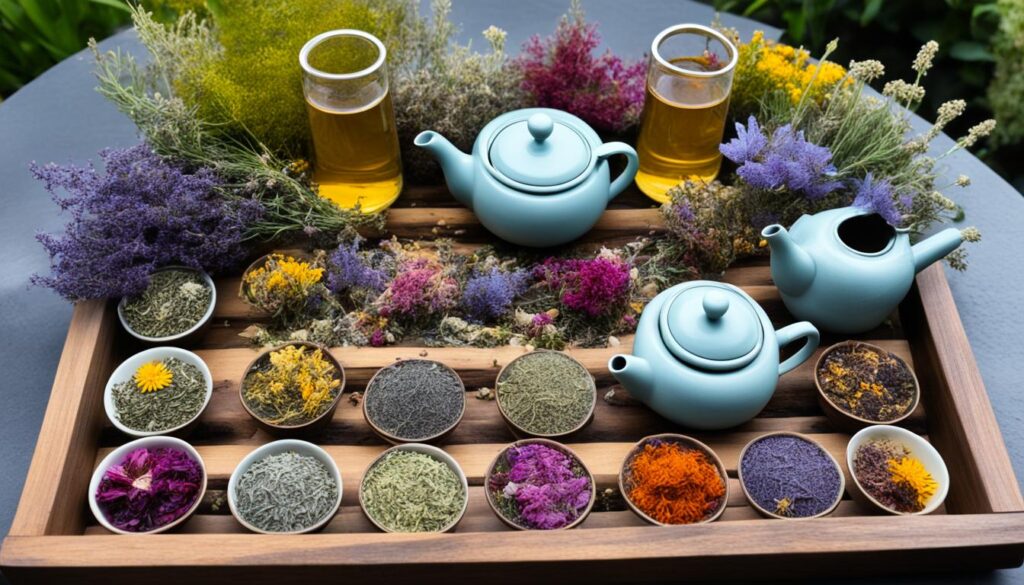
| Classic Blend | Modern Twist | Creative Infusion |
|---|---|---|
| Earl Grey | Earl Grey with Lavender | Smoked Earl Grey with Juniper |
| Masala Chai | Vanilla Chai Latte | Pumpkin Spice Chai with Caramel Drizzle |
| English Breakfast | English Breakfast with Citrus Peel | Breakfast Blend with Cacao and Orange Blossom |
| Moroccan Mint | Moroccan Mint with Matcha | Minted Mojito Green Tea |
Whether you’re drawn to the familiar warmth of the classics or intrigued by the allure of modern blends and creative infusions, the world of artisan tea blends is rich with flavors waiting to be discovered and savored. Engage your senses, experiment with our tea blending recipes, and create your own narrative in each cup.
Conclusion
As we bring our journey through the delicate craft of creating perfect infusions to a close, we’ve unlocked the essence of what makes crafting tea blends an art form that enriches the senses and nurtures the soul. At the heart of this practice is a sense of personal empowerment, an embrace of creativity, and the unbounded pleasure derived from savoring homemade tea blends tailored to our unique tastes and moods. This experience, as we have seen, is not reserved for a select few but is an attainable endeavor for all enthusiasts eager to create your own tea.
In reflecting on the insights shared, from selecting pristine leaves to experimenting with aromatic herbs, we recognize that each step in the tea blending process is a step toward mastering our own culinary narrative. The artisanship that guides the blend of flavors is akin to painting a palette where each hue represents a note in our sensory symphony. To undertake this journey is to commit to a lifelong exploration of taste, aroma, and texture—ultimately leading to the discovery of that singular, perfect infusion.
We extend an inspirational invitation to you, to carry the knowledge garnered from these pages into your own domestic sanctuaries. There, amidst the steam and the stirring, may you find joy in each trial, refinement, and sip. Continue to explore the vast possibilities, to experiment with zeal, and to indulge in the profound satisfaction that comes from sipping a cup of tea, crafted by your own hands, steeped in personal tradition, and brimming with originality.
FAQ
What are the fundamental steps in crafting tea blends?
Crafting tea blends typically starts with selecting a base tea, such as black, green, white, or herbal. Next, additional elements like aromatic herbs, spices, and floral elements are chosen for flavoring. These components are carefully measured and mixed in specific proportions to create a harmonized blend. Finally, testing and refining are crucial to achieving the desired taste profile. Each step is an opportunity to customize and create a unique tea experience.
How can one create their own perfect tea infusion?
To create your perfect tea infusion, begin by exploring different tea varieties and understanding their flavors. Experiment with adding complementing herbs and spices. Pay attention to balance and proportion to ensure a pleasing taste. Steep your blend in hot water, adjusting time and temperature based on the tea type, and refine your method through trial and error. Personal taste plays a huge role, so trust your palate and enjoy the process of experimentation.
Why might someone choose to blend their own tea?
People might choose to blend their own tea for various reasons: to tailor a blend to personal taste preferences, to express creativity, to achieve specific health benefits, or simply for the enjoyment of crafting something unique. Blending your own tea allows for a fully customized experience, making it possible to create flavors that aren’t available commercially.
What makes a tea blend ‘artisan’?
An artisan tea blend is one that is hand-crafted with special attention to the selection and combination of ingredients. These blends are often characterized by their uniqueness, quality, and the skillful balancing of flavors that might include traditional and novel components. Artisan blenders may also prioritize the source and processing of the tea leaves, opting for sustainably grown and carefully harvested ingredients.
Can the tea blending process be therapeutic?
Yes, the tea blending process can be a therapeutic activity. The act of measuring and combining ingredients requires focus and can be meditatively calming. The sensory experience of handling the tea leaves and other components, such as smelling the aromas and enjoying the visual beauty of the ingredients, can also provide a sense of relaxation and fulfillment.
Are there any specific tools required for tea blending?
While tea blending can be done with basic kitchen tools, certain equipment can make the process easier and more precise. This includes measuring spoons for consistent portioning, a mixing bowl or a blending tray for combining ingredients, airtight containers for storing blends, and perhaps a scale for those who want to be exact in their measurements. Some tea blenders also use special sieves or sifters to evenly distribute fine ingredients through the blend.
How important is the visual aspect of a tea blend?
The visual aspect of a tea blend is quite important as it adds to the overall sensory experience. A visually appealing blend can enhance the enjoyment and anticipation of the tea before it’s even brewed. Colorful petals, vibrant herbs, and well-chosen tea leaves can make a blend striking and attractive, adding a touch of sophistication to the tea-drinking experience.
What’s the role of experimentation in tea blending?
Experimentation is central to tea blending. It allows blenders to explore different combinations, adjust proportions, and refine flavor profiles to perfection. Experimentation encourages innovation and can lead to the discovery of new and exciting blends. It’s a critical process for anyone looking to create a personal or signature tea blend that reflects individual taste and style.
